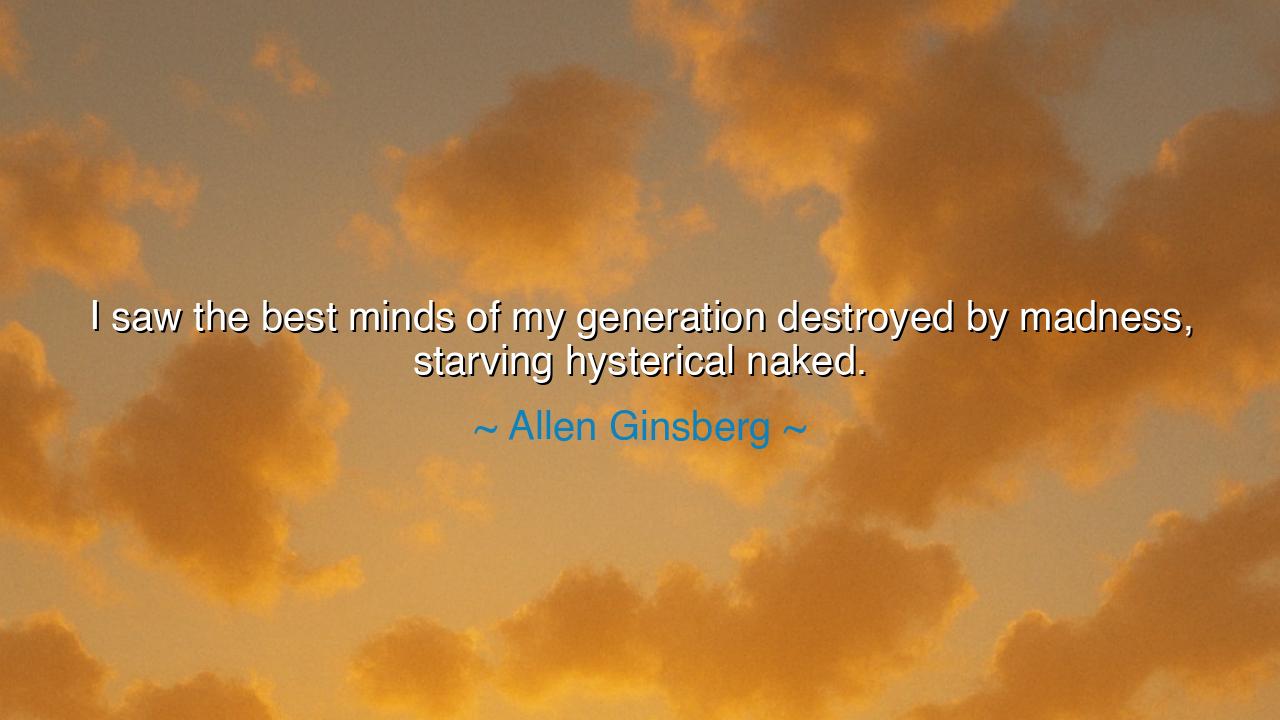
I saw the best minds of my generation destroyed by madness






Host: The room was still, bathed in the soft glow of the lamp, the silence between them both calming and charged with the weight of Ginsberg’s words. Outside, the world had quieted into the peaceful rhythm of the evening. Jeeny sat at the table, her fingers lightly tracing the rim of her cup, absorbed in thought. Jack, standing by the window, gazed out at the darkened world, his posture relaxed but his mind clearly absorbed in contemplation. It was a quiet, almost reflective moment between them.
Jeeny: (breaking the silence, her voice soft but thoughtful) “I came across something by Allen Ginsberg today that really struck me. He said, ‘I saw the best minds of my generation destroyed by madness, starving hysterical naked.’ What do you think about that?”
Jack: (pauses, his voice low) “It’s such a powerful and haunting statement, isn’t it? Ginsberg is capturing the sense of disillusionment and desperation that many of the intellectual and creative minds of his generation experienced. The ‘best minds’—those full of potential and ideas—destroyed not by external forces, but by the madness of the world around them. It speaks to the intense inner turmoil, the existential crisis that so many people struggle with when they’re faced with a world that seems to lack meaning or purpose.”
Jeeny: (nodding slowly) “Yes, and there’s something so raw in that image of being ‘starving hysterical naked.’ It’s not just a physical image—it’s almost like a metaphor for the emotional and intellectual emptiness they were feeling. It’s a portrayal of people who are vulnerable, exposed to the world in ways that are uncomfortable, vulnerable to their own fears and doubts. It’s not just hunger—it’s a deep, profound hollowness that comes from a sense of alienation.”
Host: The stillness in the room deepened, as Jeeny and Jack reflected on the deeper meaning of Ginsberg’s words. Outside, the world had quieted, but inside, their conversation had turned inward, reflecting on the challenges of meaning, purpose, and identity in the face of a chaotic world.
Jack: (his voice quieter now, more introspective) “What strikes me is how Ginsberg’s words capture a generation’s sense of being lost, of struggling to find a foothold in a society that doesn’t offer the answers they’re searching for. It’s like they had all this potential, this brilliance, but they were unable to reconcile it with the madness around them. And that dissonance—between their inner lives and the world outside—led them to unravel, to be ‘destroyed.’ It’s a tragic image of intellectuals and creatives not being able to make sense of a world that didn’t seem to care about their struggles.”
Jeeny: (softly) “Yes, it’s a reminder that the search for meaning isn’t always something we can control. The world can feel overwhelming, and when we don’t find the answers we’re looking for, it can lead to confusion, frustration, and despair. Ginsberg’s portrayal of these minds isn’t just about losing hope—it’s about the tension between idealism and the reality they’re forced to confront. The madness he speaks of is more than just chaos; it’s the sense of being consumed by the weight of societal expectations, personal doubts, and an uncertain future.”
Jack: (nodding slowly) “Exactly. It’s like Ginsberg is showing us the fragility of the human spirit in the face of a world that feels out of control. These people—these minds—weren’t just destroyed by madness. They were consumed by the weight of their own expectations, their own need for purpose, and the inability to find fulfillment in a world that didn’t seem to have answers. It’s a powerful commentary on how society and existence can wear down even the brightest and most idealistic.”
Jeeny: (smiling gently) “Yes, and I think that’s what makes Ginsberg’s words so haunting—they aren’t just a critique of the world around him, but a reflection on the fragility of the human condition. We all carry that potential for greatness, but when we can’t find a way to reconcile that with the world, it’s easy to feel exposed and vulnerable, just like those ‘hysterical naked’ minds. It’s a reminder that sometimes, the greatest minds can be burdened by their own perceptions of the world.”
Host: The quiet in the room seemed deeper now, as if their conversation had reached a place of shared understanding about the complexity of human emotion, creativity, and the struggle for meaning. Outside, the world had quieted, but inside, there was a sense of recognition that Ginsberg’s words speak to something fundamental about the human experience.
Jack: (smiling softly, his voice more assured) “It’s a reminder that we all struggle to find our place in the world, to understand where we fit in. But sometimes, it’s the unpredictability and the struggle itself that give us meaning. Maybe what Ginsberg was getting at is that striving for meaning is the essence of being human—even if it sometimes leads us into chaos.”
Jeeny: (nodding warmly) “Exactly. And in that chaos, in that searching, we find pieces of ourselves. The search for meaning might not always lead to the answers we want, but it leads us to greater understanding, even if it’s difficult or painful.”
Host: The world outside had quieted to a peaceful stillness, but inside, the room was filled with understanding. Jeeny and Jack had uncovered the deeper truth in Ginsberg’s words—that the struggle for meaning, the search for truth in a world full of chaos, is an essential part of the human experience. Even in the face of despair and confusion, we continue to search, to create, and to understand. The night continued outside, but inside, the room felt full of the realization that our greatest minds, like all of us, are shaped by the very struggle to find meaning in an often unpredictable world.






AAdministratorAdministrator
Welcome, honored guests. Please leave a comment, we will respond soon